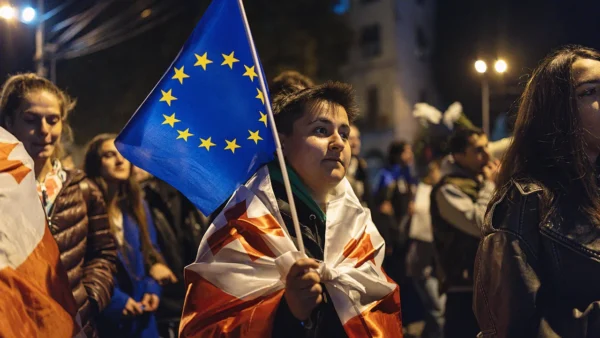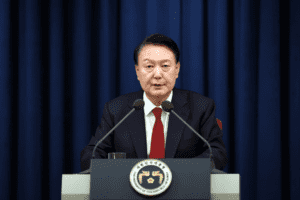Protests erupted throughout Georgia after the government suspended EU membership talks until 2028, demanding democratic reforms and closer EU ties. Georgia is a country located at the intersection of Eastern Europe and West Asia. It is part of the Caucasus region between the Black Sea to the west, Russia to the north, Turkey to the southwest, Armenia to the South, and Azerbaijan to the southeast. Georgia covers 69,700 square kilometers (26,900 square miles). As a country with a population of 3.7 million, its stability and sovereignty are critical in the region. Following the government’s decision to halt EU membership negotiations until 2028, Georgia has seen a rise in protests and political unrest in recent weeks. At nationwide rallies in Tbilisi, thousands of Georgians have taken to the streets to demand democratic reforms and renewed commitment to the EU. Georgia’s long history of protecting its stability, and sovereignty, and efforts to strengthen its links with the West are highlighted by the government’s efforts to handle this crisis.

This map shows Georgia and its disputed regions, South Ossetia and Abkhazia, image courtesy of BBC News.
Understanding Georgia’s past is crucial to contextualizing its 2024 bid to join the EU. After the USSR collapsed, Georgia gained its independence from the Soviet Union in 1991. Eduard Shevardnadze arrived in Georgia in 1992 to assume power after the government had been taken over by criminals and warlords who were unable to bring the country together. The transition to sovereignty was difficult because at the time, Georgia was deeply divided with various regions and factions fighting for control or wanting more autonomy as the Soviet Union fell apart. Territorial disputes between South Ossetia and Abkhazia further divided the nation, leading to violent conflicts and humanitarian problems. Shevardnadze attempted to undo the harm brought about by Russia’s ongoing encouragement of separatist activities in these regions. In the end, he ultimately succeeded in getting Georgia post-conflict rehabilitation and humanitarian aid. Yet, Georgia was never quite able to regain its status as a completely independent state.
As a result, Georgia turned its attention to the West and sought deeper connections with NATO and the EU. During this period, they promoted democratic governance after President Mikheil Saakashvili was elected in 2003 as a result of the Rose Revolution. The Rose Revolution was a peaceful 2003 movement that ousted Georgia’s corrupt government and promoted democratic reforms. His goal was to modernize the country and move it toward Europe and away from Russian influence. Georgia aimed to integrate with Western political, economic, and security institutions to break away from Russia’s influence and its Soviet-era ties, such as through EU membership. When the country signed an Association Agreement with the EU in 2014, it pledged to implement a number of political and economic changes. The agreement was recognized as a major turning point in the integration process, signaling Georgia’s intention to become a member of the EU and being consistent with European principles like democracy, human rights, and the rule of law. The public’s support remained strong during this period. Many Georgians saw joining the EU as an opportunity to better their own and their nations’ future. Benefits of EU membership include more economic prospects, improved democratic institutions, and access to European markets. In response, the EU urged Georgia to implement significant reforms in order to fulfill the requirements for full membership. After meeting the conditions, Georgia applied to join the EU on March 3, 2022. The EU granted Georgia “candidate status” on December 14, 2023.
In late 2024, Georgian Prime Minister Irakli Kobakhidze shocked and enraged the country by declaring that the government would suspend EU membership talks. Prime Minister Irakli Kobakhidze suspended EU membership talks after the ruling Georgian Dream party, which has pro-Russian views, claimed an unsettling victory in last month’s parliamentary election. The election was followed by large-scale rallies, allegations of electoral fraud, and an opposition boycott of parliament. Despite denying claims of vote fraud, Georgian Dream’s critics argue the party has pushed Tbilisi away from Europe and toward Moscow, causing democratic decline. Consequently, the EU has suspended Georgia’s entrance and halted financial support after a “foreign influence” bill was passed, which was widely viewed as a setback to democratic freedoms.

Irakli Kobakhidze is the Prime Minister of Georgia and a key figure in the Georgian Dream party, courtesy of Mariam Nikuradze/OC Media
According to the Congressional Research Service, “The legislation requires nongovernmental organizations (NGOs) and media outlets that receive more than 20% of their funding from foreign sources to register as organizations “pursuing the interest of a foreign power.” The EU believes this law could silence media outlets, NGOs, and human rights groups by labeling them as “foreign agents.” Russia passed a similar “foreign agent” law in 2012, which was used to shut down or control independent media and critics of the government. The EU says this is unfair as it portrays these groups in a negative light, limits free speech, and copies repressive tactics used by Russia. This goes against democratic principles like freedom of speech and the press. The adoption of this law negatively impacts Georgia’s progress on the EU path and would force a review of Georgia’s ties with the EU.

This image shows a protester holding the EU and Georgian flags, showing support for Georgia’s European integration, courtesy of The Economist
Several variables, such as political stability, the continuous execution of reforms, and the capacity to resolve internal conflicts, will affect Georgia’s long-term chances of entering the EU. Georgia’s continuous battle to maintain a balance between its goals for European integration and the political reality of its region is reflected in the current instability there today. The situation will likely change unanticipatedly as long as the protests continue and the government is under nationwide and international pressure. The following months and years will determine whether Georgia will reaffirm its commitment to the European future it has always envisioned or if it will deviate from the West and cave to pressure from its large neighbor, Russia. The choice on the way forward is in Georgia’s hands now.
Featured image: Protesters with EU flags, frustrated by Russia’s influence on Georgia, courtesy of Vano Shalomov/AFP via Getty Images.



